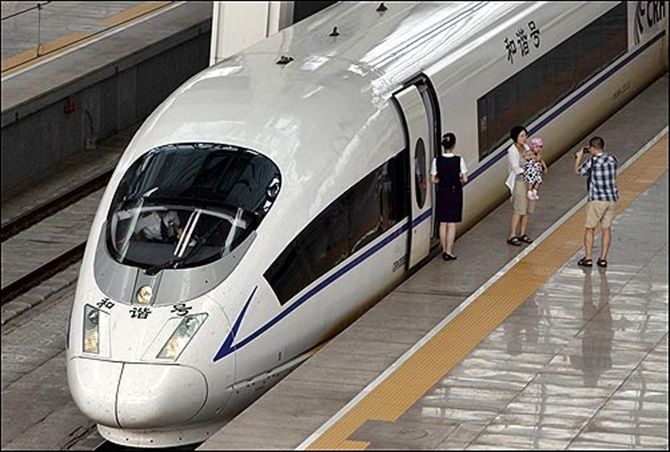
China will soon conduct a trial run of its new high-speed bullet train, which uses a cutting-edge traction system with simplified configuration and low fuel usage.
The permanent magnet synchronous traction system was developed by CSR Corp Ltd, one of China's two major locomotive makers, at its Zhuzhou Institute in Hunan Province, state-run China Daily reported.
The system has passed preliminary examination by national railway test authorities and has been installed on a new bullet train produced by CSR Qingdao Sifang Co Ltd in Shandong Province.
"If everything goes well, we will begin a trial run in a short time and then improve the equipment based on the tests," said Jia Limin at Beijing Jiaotong University who heads
China's high-speed railway innovation programme.

"I think the new train will become fully operational by 2018," he said.
"Compared to the alternating current asynchronous motors that are commonly used for a bullet train's traction system, the permanent magnet synchronous traction boasts high power, a simple configuration and low fuel consumption," Jia said.
The expert added that the new system has fewer parts than the current traction apparatus, so it is more reliable and efficient.
Other advantages include occupying a smaller space on the train and producing less noise during operation.
Xu Junfeng, who oversaw the traction system's development, said, "Currently, six out of eight cars of a bullet train need to have engines."

"Using the new traction system will allow only four cars to be fitted with engines," Xu said, "which will substantially reduce costs and maintenance procedures."
China has developed the the expensive high speed rail network in a big way in the past decade connecting most of the country with bullet train network.
It is now making a major bid across the world, including India, competing with Japan and Germany to win bids to construct high speed trains.
During the September visit of Chinese President Xi Jinping to India, China has been offered a corridor to conduct a feasibility study.
The Indian railways is in the process of identifying the corridor.
Japan is conducting a feasibility study to build a bullet train for Mumbai-Ahemedabad corridor Early this month, a Chinese-led consortium has won $3.7 billion bid to build Mexico's first high-speed train project.
The project involves building a bullet train line to connect Mexico City with the industrial hub of Queretaro to the north by 2017.
Upon completion, the bullet train service would cut travel time from about two and a half hours to less than an hour, with trains travelling at a maximum speed of 300 kilometres per hour.
The images are used for representational purpose only











 © 2025
© 2025